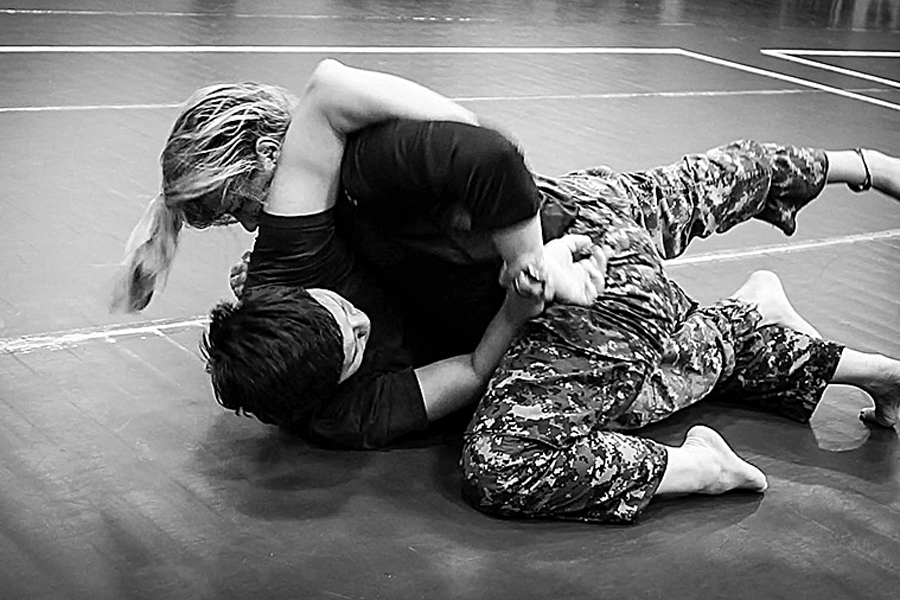Combatives championships reinforce hand-to-hand fighting skills
By Lookout on Sep 01, 2017 with Comments 0

Steven Fouchard, Army Public Affairs ~
The lead organizer of an annual Canadian Armed Forces (CAF) fighting competition says he hopes it will help bring what is known as “combatives” training to the forefront of essential military skills development in Canada.
Training a soldier, says Lieutenant-Colonel Steve Burgess, is like building a house. It’s best to start with the foundation and build up from there.
“Hand-to-hand combat is the essence of warrior training,” he says. “I would argue that when you start training soldiers by exposing them to the application of projectile weapons such as firearms, prior to developing their baseline hand-to-hand combative skills, that’s starting from the roof and going down.”
That, he added, is how great warrior cultures such as the Samurai of Japan did it.
“They believed that to master a weapon, you have to master yourself first. You are the ultimate weapon in a fight. So it’s not what you’re holding in your hand, it’s your ability to use it in a fight and develop the mindset to manage your fear.”
LCol Burgess is a Senior Military Combatives Instructor in the CAF. He holds black belts in karate, judo and Brazilian jiu-jitsu and, since joining the CAF in 2001, has spent most of that time teaching hand-to-hand combat to both conventional and special operations forces.
Most experts consider combatives techniques as those used to engage an opponent at a distance of 25 metres or less, either hand-to-hand or with small weapons.
In search of a way to increase the visibility of hand-to-hand combat in the CAF, LCol Burgess organized the inaugural Military Combatives Grappling Championship (MCGC) at Canadian Forces Base Petawawa in 2013.
“I was trying to figure out a way of actually bringing this back to more of a level of importance to the CAF itself,” he says. “So I figured the easiest way to do that would be to create something of an event or a forum where soldiers, sailors, aviators and special operators could all come together to practice it in a competitive, yet safe way.”
The event has grown with each passing year and LCol Burgess estimates that participation in the 2017 edition, which took place in June, was eight times that of the first.
The 2017 competitors were drawn from 35 individual units from across Canada, and Reservists competed alongside Regular Force members. Members of 1st Battalion Royal Canadian Regiment took the 2017 Team Championship. Master Corporal Darren McGuire of 3rd Battalion Royal Canadian Regiment attained the title of Absolute Champion.
LCol Burgess said MCGC’s popularity at the grassroots level does seem to be having an effect higher up in the CAF.
“Even with the pace of operations and the high operational tempo of the CAF, we on average will always field about 130 competitors for every event,” he says. “I think indications are that the chain of command is certainly taking notice of it. There’s a lot more unit commanding officers that are also engaging their units in combatives training. Last year we had tournaments that were held in Edmonton at the brigade level.”
He continued, “There were also units in Valcartier [Quebec] that held combatives tournaments at the unit level. And there’s going to be units this summer holding battalion-level tournaments. They are all generated and supported by the unit chains of command.”
LCol Burgess discovered the martial arts as a youth and says these skills, as an aspect of combatives in general, can offer much more than just fighting skills.
“Not only did it give me the physical skills to be able protect myself, but it gave me such a tremendous level of self-confidence,” he says. “A lot of people see it as just technique. All of the other things that you get from it are not as quantifiable. In the U.S. right now, they’re using combatives training in conjunction with more traditional methods of treatment for Post-Traumatic Stress Disorder. What it does is it gives you a sense of control again. You learn to deal with high-pressure, high-threat environments. It teaches you to stay calm and know that you always have a fighting chance.”
Registration for 2018’s MCGC will open in the fall of 2017. More information can be found at www.combativesgrappling.com.
Filed Under: Top Stories
About the Author:





